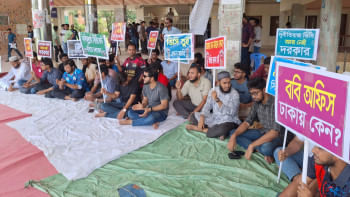Teletalk hamstrung by weak power backup

A significant portion of Teletalk's mobile network towers lacks adequate battery backup systems, exacerbating customer frustrations with its unreliable service and contributing to a steady decline in its subscriber base.
According to the state-run carrier, there are 5,661 base transceiver stations (BTSs) that facilitate access to its network. However, of the 3,856 towers run on batteries supplied by Teletalk, 21.52 percent can't provide more than one minute of backup.
This means customers who are under the coverage of the 830 towers can't access the network if there is a power outage.
Similarly, about 40 percent of Teletalk's towers can no longer provide network access if electricity outages persist for more than an hour.
This grim scenario was presented to Zunaid Ahmed Palak, state minister for telecom and ICT, when he visited the head office of the state-owned telecom operator in the capital's Gulshan recently.
In Bangladesh, BTS or towers are operated by either telecom companies or third-party companies, which manage and operate the facilities to support mobile network coverage.
According to officials of the companies, the standard battery backup duration for a BTS typically ranges from 4 to 8 hours depending on electricity availability, ensuring that a tower remains operational during short to moderate power outages.
Teletalk had installed batteries and rectifiers at its sites around five years ago during the second phase of its 3G rollout and another project, according to the presentation, which was seen by The Daily Star.
At that time, batteries and rectifiers were procured in small quantities, but it was not enough to overcome the larger problem.
In the face of frequent load-shedding, Teletalk's towers as well as transmission links continue to be impacted and a huge number of towers go dark.
Due to the lack of battery backup, Teletalk is suffering to provide continuity, Palak was told during the presentation.
AKM Habibur Rahman, managing director of Teletalk, acknowledged the dire situation.
"It is undeniable that Teletalk's battery backup duration is very short. Customers report signal loss once power outages occur."
He said they had taken initiatives to increase the duration of battery backup.
"We have proposed a Tk 45 crore project for batteries and rectifiers. It is now being evaluated by the planning commission."
Besides, the work on a Tk 2,204 crore project for Teletalk's 5G readiness is ongoing.
"After that, we will be able to utilise some of the spare money from the project to upgrade the power backup systems for the existing network," Rahman added.
A Teletalk user, wishing anonymity, said he had preferred to use Teletalk because it provided internet packages at a lower cost than other operators.
"However, I was compelled to discontinue my Teletalk SIM six months ago as I couldn't get network connection during power outages."
The dissatisfaction of customers is also reflected in Teletalk's dwindling customer base.
Although the number of mobile subscribers in the country increased by about 1.06 crore in the 12 months to December, Teletalk lost 2.3 lakh customers.
Thus, it saw its market share shrink to just 3.38 percent, accounting for 64.6 lakh customers out of a total base of 19.08 crore mobile subscribers.
As it keeps losing customers and its performance across various service metrics deteriorates, Teletalk's revival appears uncertain.
In the last financial year ending on June 30, the carrier's losses amounted to Tk 1,337 crore, reflecting a persistent trend of net losses since its establishment. It only made a profit in 2010-11 and 2012-13, according to the financial report for 2022-23.
Power backups of other companies
Of the 44,629 towers operational in the country, about 20,000 are managed by Edotco Bangladesh for the clients, namely Grameenphone, Robi, Banglalink and Teletalk.
"We have the capacity to provide two hours to six hours of power backup depending on the location and structure of the tower," Md Monowar Sikder, director for operations at Edotco Bangladesh, told The Daily Star.
Towers are mostly built considering customer demands and location, but the supply of electricity from the national grid is not the same everywhere.
"So, based on the location and nature of the tower, we deploy the power backup system," Sikder added.
Edotco has multiple alternative power sources. Twelve percent of the sites can run on solar energy, and 12 percent through fixed automatic diesel generators. It also deployed 13 wind turbines in costal areas. Portable generators are also available in the case of prolonged outages.
Summit Towers, which has 4,230 towers under its portfolio, said it arranges four to eight hours of battery backup based on power grid availability of a certain area.
It also has portable generators, fixed generators, and solar power for over 20 percent of its sites as an alternative.

 For all latest news, follow The Daily Star's Google News channel.
For all latest news, follow The Daily Star's Google News channel. 









Comments